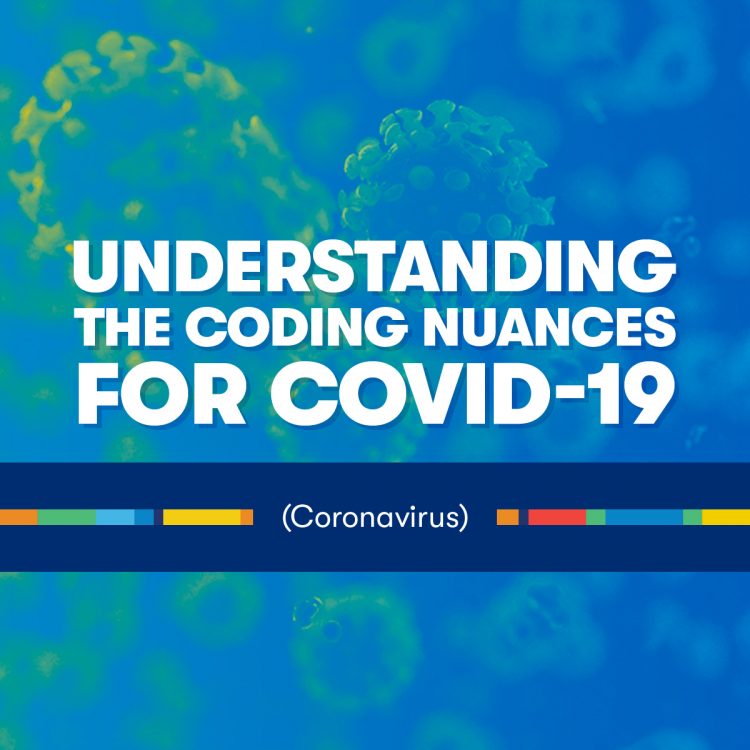

As coding and billing regulations continuously change, the content of this article may not be the most up-to-date information and is not intended to take the place of either the written policies or regulations. We encourage participants to review the specific regulations and other interpretive materials as necessary.
The 2019 novel Coronavirus, also known as COVID-19, is of course, top-of-mind for everyone right now. As we began writing this post, the World Health Organization (WHO) declared the virus to be a pandemic, and it now has infected patients in 118 countries and regions around the globe, with over 124,000 confirmed cases.
In order to track new cases of COVID-19 and to provide reimbursement for testing, the Centers for Medicare & Medicaid Services (CMS) has created two new HCPCS codes that are effective February 4, 2020, with an implementation date of April 1, 2020. This is what you need to know about these dates:
HCPCS code U0001, CDC 2019 novel Coronavirus (2019-nCoV) real-time RT-PCR diagnostic panel, is used specifically by CDC testing laboratories to test patients for COVID-19. HCPCS code U0002, 2019-nCoV Coronavirus, SARS-CoV-2/2019-nCoV (COVID-19), any technique, multiple types or subtypes (includes all targets), non-CDC, allows non-CDC laboratories to bill for COVID-19 testing. Local Medicare Administrative Contractors (MACs) will determine the payment rates for their respective jurisdictions until more information is available to establish a national payment rate.
The Centers for Disease Control and Prevention (CDC) also recently published supplemental ICD-10-CM Official Guidelines for Coding and Reporting related to the COVID-19 Coronavirus outbreak. These are effective 02/20/2020. It's critically important that the newly-published coding guidelines be followed, as they will be used to enable accurate tracking of COVID-19 cases.
According to the new guidelines, pneumonia that has been confirmed to be due to COVID-19 should be assigned codes J12.89, Other viral pneumonia, and B97.29, Other coronavirus as the cause of diseases classified elsewhere. Acute bronchitis that has been confirmed to be due to COVID-19 should be coded using J20.8, Acute bronchitis due to other specified organisms, and B97.29 (see above description). Unspecified bronchitis due to COVID-19 should be assigned codes J40, Bronchitis, not specified as acute or chronic, in addition to code B97.29 (again, as described above).
Respiratory infections confirmed to be caused by COVID-19 should be assigned code J22, Unspecified acute lower respiratory infection, NOS, if specified as acute; or, as J98.8, Other specified respiratory disorders, if there is no documentation of an acute infection. In both cases, code B97.29 should also be assigned to specify that the patient has been diagnosed with COVID-19.
Acute respiratory distress syndrome (ARDS) that develops in patients with a confirmed COVID-19 infection should be assigned code J80, Acute respiratory distress syndrome, in addition to code B97.29.
For patients with a suspected exposure to COVID-19 that is ruled out following evaluation, assign code Z03.818, Encounter for observation for suspected exposure to other biological agents ruled out. For patients with an actual exposure to someone with a confirmed COVID-19 infection, it is appropriate to assign code Z20.828, Contact with and (suspected) exposure to other viral communicable diseases.
For patients who present with signs and symptoms of the virus, such as fever, cough, or shortness of breath but without a definitive diagnosis, the appropriate code(s) for the symptoms should be assigned.
However, if a provider documents “suspected”, “possible”, or “probable” COVID-19, DO NOT ASSIGN code B97.29. Rather, assign code(s) for the signs and symptoms the patient is experiencing.
The worldwide spread of the Coronavirus is causing rapid change, so it is important to frequently check official sites. CMS has published a FAQ document to assist healthcare providers with questions related to COVID-19. The FAQ document contains links to other documents that may be helpful for healthcare providers and Medicare beneficiaries. In addition, the CDC and the WHO are updating their websites regularly with the latest information and guidance. And, of course, Vitalware will be sure to keep you updated as new coding and billing guidelines emerge.